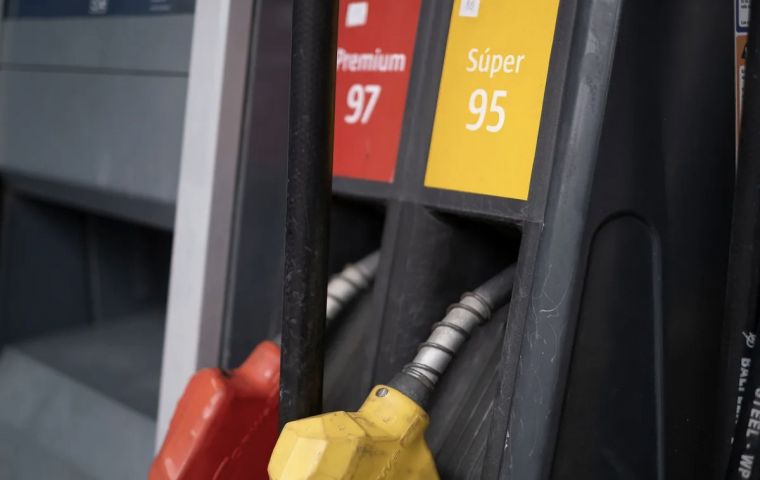MercoPress. South Atlantic News Agency
Price of gasoline to fall in October, diesel and cooking gas remain stable in Uruguay
 The current price of diesel is still disadvantageous to Uruguayan agriculture producers when compared to those of Brazil and Paraguay, Lago argued
The current price of diesel is still disadvantageous to Uruguayan agriculture producers when compared to those of Brazil and Paraguay, Lago argued Uruguayan authorities ordered a reduction in the price of gasoline at pumps of UY$ 3 (US$ 0.073) per liter effective Oct. 1 while diesel and cooking gas will remain unchanged, it was announced in Montevideo.
The decision was taken in accordance with the Import Parity Price Indicator (PPI) for the last month in addition to the tariff policy that reflects the evolution of the international market.
Regarding diesel fuel, the government decided to keep its value despite the PPI recommending a UY$ 1 per liter increase.
“The measure is based on the Executive's commitment to supporting the economic recovery and with the purpose of minimizing the impact of the escalation of prices of this fuel on the productive chains,” a Presidential statement read.
Cooking gas (known as Supergas), will also remain stable and way below international markets, it was explained.
Meanwhile, Uruguayan Rice Growers Association (ACA) President Alfredo Lago questioned the government's decision to bring down the price of gasoline at pumps from UY$ 77.88 (US$ 1.88) to UY$ 74.88 (US$ 1.81), while the price diesel remained at UY$ 64.99 (US$ 1.57) per liter.
Lago insisted there was a global trend toward narrowing the gap between gasoline and diesel oil and stressed that the Uruguayan Government's decision was based on a report from the Regulatory Union of Energy and Water Services (Ursea) which hinges on the IPP, which “clearly does not reflect the economic reality of the fuel chain.”
In Lago's view, the Ursea report is one-sided and based on assumptions; “it is not on the reality of the market and the business, it considers a single origin of the oil, a single means of transportation, a single entry into the country of the product, a single refinery site... why not consider the value of oil in other markets or the costs of the refineries in the region?”.
“We are tied to a way of calculating the IPP that is too theoretical” and monopoly-oriented, he added while highlighting the role of the state-run Ancap oil company in the procedure. Lago said that when the peso appreciated by 8% and the price of crude oil fell, Ancap had profits based on a price calculation system that continues to generate a more expensive diesel oil value in Uruguay than in countries with which domestic output competes, such as Paraguay and Brazil.
“We are still expensive, there is a problem of competitiveness that is not solved,” he underlined.




Top Comments
Disclaimer & comment rulesCommenting for this story is now closed.
If you have a Facebook account, become a fan and comment on our Facebook Page!